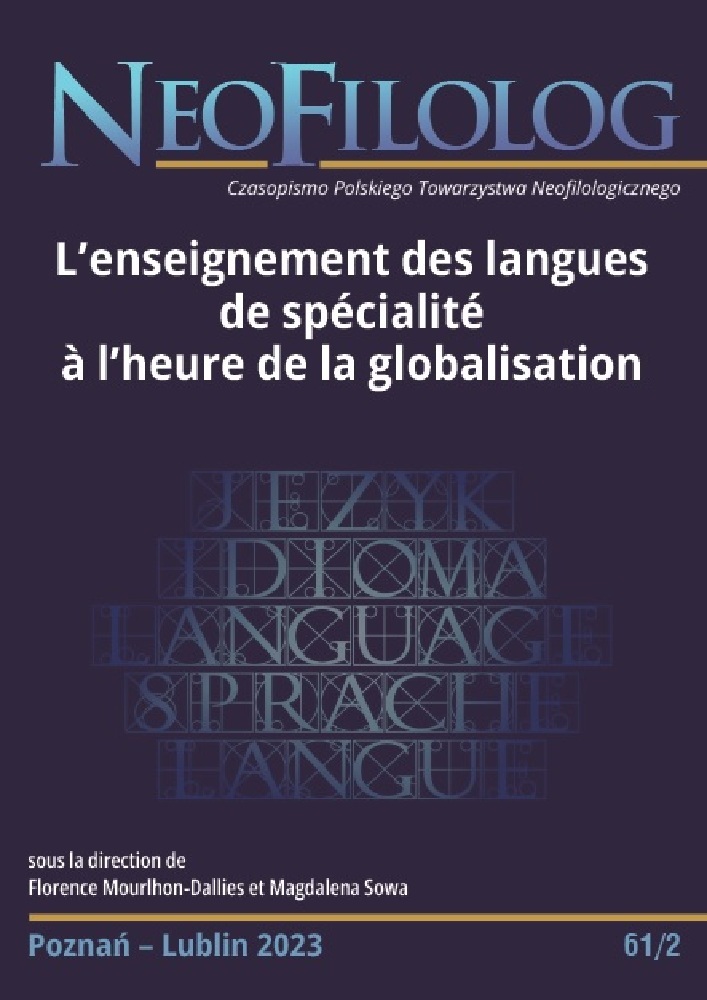Abstrakt
In the great upheavals of globalization, this article will focus on those who are not directly involved in this great movement. These include migrants. For them, the most useful language is that of survival, both social and professional. In this context, we will focus on the training demands that emanate from certain professional fields in France, formulated in the urgency of economic and human situations that concern the public employment actors, the training structures and of course the learners/workers themselves. Indeed, certain economic sectors are under pressure, in the sense that they are struggling to recruit. Recourse to migrant labour is therefore one of the solutions, but, in most cases, the question of mastering the language of the host country in oral and/or written form arises,. Didactic solutions must be found on a case-by-case basis, in a very precise and specific way. In order to describe and analyse this situation, the article will be based on two experiences of technical and linguistic training in two vocational training fields: i) catering and ii) building and public works.
Bibliografia
Adami H. (2020), Enseigner le français aux adultes migrants. Paris : Hachette.
Adami H. (2021), Les formations linguistiques à visée professionnelle pour les migrants en France : orientations sociales et didactiques. « Langues, cultures et sociétés », Vol. 7, n°1, 4–12. En ligne : https://revues.imist.ma/index.php/LCS/article/view/26417/13997 [consulté 16.06.2023].
Boutet J. (2001), La part langagière du travail : bilan et évolution. « Langage et société », n°98/4, 17–42. DOI: https://doi.org/10.3917/ls.098.0017
Garcia D., Le Bras H. (dir.) (2017), Archéologie des migrations. Paris : La Découverte. DOI: https://doi.org/10.3917/dec.garci.2017.01
Manné I., Rousseau L. (2022), Les métiers en forte tension dans le Grand Est : des recrutements plus souvent en contrat stable. « Insee Analyses Grand Est », n° 152.
Mangiante J.-M, Parpette C. (2004), Le français sur objectif spécifique : de l’analyse des besoins à l’élaboration d’un cours. Paris : Hachette.
Mangiante J.-M., Parpette C. (2022), Le FOS aujourd’hui : état de la recherche en Français sur Objectif Spécifique. Bruxelles : Peter Lang. DOI: https://doi.org/10.3726/b19432
Medina C. (2014), Le français parlé dans les Bâtiments et Travaux publics : de l’analyse interactionnelle à la constitution d’un parcours d’apprentissage. Presses Académiques Francophones.
Mourlhon-Dallies F. (2008), Enseigner une langue à des fins professionnelles. Paris : Didier. DOI: https://doi.org/10.14375/NP.9782278069989
Sanders L., Bretagnolle A., Brun P., Ozouf-Marignier M.V., Verdier N. (dir.) (2020), Le temps long du peuplement. Tours : Presses universitaires François-Rabelais.
Schwartz Y., Durrive L. (2003), Travail et ergologie. Entretiens sur l’activité humaine. Toulouse : Octarès Editions.
Licencja

Utwór dostępny jest na licencji Creative Commons Uznanie autorstwa – Bez utworów zależnych 4.0 Międzynarodowe.
Przedstawiany utwór (artykuł) upubliczniany jest na podstawie umowy z autorem i na licencji Creative Commons Attribution-NoDerivatives 4.0 International (CC BY-ND 4.0).
Użytkownicy mają obowiązek podania wraz z rozpowszechnionym utworem, informacji o autorstwie, tytule, źródle (odnośniki do oryginalnego utworu, DOI) oraz samej licencji;
- bez tworzenia utworów zależnych,
- utwór musi być zachowany w oryginalnej postaci.
Uniwersytet im. Adama Mickiewicza w Poznaniu zachowuje prawo do czasopisma jako całości (układ, forma graficzna, tytuł, projekt okładki, logo itp.).
